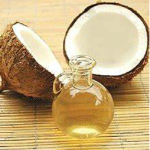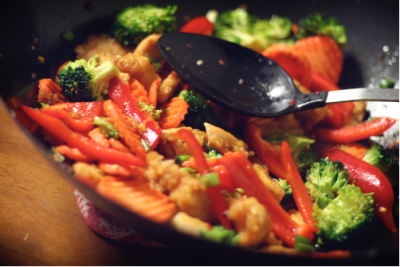Written by UConn Dietetic Intern Olivia DuBois
 Coconut oil has become wildly popular in recent years due to its supposed health benefits. Coconut oil has been heavily promoted in several trendy diets such as the Ketogenic and Paleo diets, in addition to the increased consumer demand for more plant-based foods. In 2016, NY Times published a survey which found that 72% of Americans rated coconut oil as “healthy”, though only 37% of nutrition experts agreed1. Let’s figure out why this is!
Coconut oil has become wildly popular in recent years due to its supposed health benefits. Coconut oil has been heavily promoted in several trendy diets such as the Ketogenic and Paleo diets, in addition to the increased consumer demand for more plant-based foods. In 2016, NY Times published a survey which found that 72% of Americans rated coconut oil as “healthy”, though only 37% of nutrition experts agreed1. Let’s figure out why this is!
So, What Is Coconut Oil?
Coconut oil is extracted from the “meat” of the coconut. Virgin or extra virgin coconut oil is made using fresh “coconut meat” and refined coconut oil is made using dried “coconut meat” called copra. At room temperature coconut oil is solid, similar to butter and lard. It is 100% fat with 80-90% saturated fat2. Each tablespoon of coconut oil has about 120 calories and 14 grams of fat.
Coconut Oil and Health
The information circulating on the Internet labels coconut oil as a “miracle food” that promotes a slew of health benefits from weight loss to smoother skin, to a healthy heart. Let’s look at the evidence to find out the truth about these health claims.
Weight Loss
There are many weight loss plans encouraging the use of coconut oil made of MCTs (“medium chain triglycerides”), which is a type of fat thought to increase feelings of fullness and prevent fat storage. While MCTs in the diet may be beneficial in supporting weight loss, these claims are not fully true due to the types of coconut oil available to us in grocery stores. The coconut oil we can buy at grocery stores does not have the same amount of MCTs as the coconut oil studied in weight loss, and therefore may not have the same effects5.
Heart Health
 Coconut oil’s high saturated fat content can contribute to a higher risk for coronary artery disease including higher cholesterol levels and blood pressure. In a research study, coconut oil was found to increase both LDL (bad) and HDL (good) cholesterol levels when compared to vegetable oils like sunflower, canola, and olive oils. Therefore, the cholesterol-raising effects of coconut oil were similar to other saturated fats like meats and high-fat dairy, and thus cannot be labeled a heart-healthy food and should be limited3. The American Heart Association currently advises healthy Americans to consume less than 10% of total daily calories from saturated fat and less than 6% of total daily calories for those with heart disease4.
Coconut oil’s high saturated fat content can contribute to a higher risk for coronary artery disease including higher cholesterol levels and blood pressure. In a research study, coconut oil was found to increase both LDL (bad) and HDL (good) cholesterol levels when compared to vegetable oils like sunflower, canola, and olive oils. Therefore, the cholesterol-raising effects of coconut oil were similar to other saturated fats like meats and high-fat dairy, and thus cannot be labeled a heart-healthy food and should be limited3. The American Heart Association currently advises healthy Americans to consume less than 10% of total daily calories from saturated fat and less than 6% of total daily calories for those with heart disease4.
The Bottom Line
Coconut oil is high in saturated fat. Based on research, we know diets high in saturated fat may raise cholesterol levels in the body, which can increase your risk for developing plaque formations that can lead to heart attacks or stroke. However, you do not need to totally avoid coconut oil. Similar to other saturated fats like those found in butter, lard, bacon fat, and solid shortening, in moderation, coconut oil can fit into a healthy diet. Be cautious of how much you are using! You might enjoy coconut oil and its flavor in a veggie stir fry or for baked cookies! Good alternatives in place of saturated fats are mono and polyunsaturated fats. These can be found in olive oil, canola oil, vegetable oil, corn oil, and peanut oil.
Try This Quick Veggie Stir Fry (Serves 4)
 Ingredients
Ingredients
4 cups broccoli florets
4 large carrots (chopped)
1 red pepper (chopped, or mix of colored peppers)
10 mushrooms (quartered)
1 tablespoon coconut oil
3 cloves garlic (minced)
1 tablespoon ginger (grated)
1/2 cup vegetable stock
2 teaspoons corn starch
3 tablespoons low sodium soy sauce
1 teaspoon rice vinegar
2 pinches red pepper flakes
1/2 cup roasted cashews (optional)
Rice, grains or noodles of choice
For more recipe details click here
Directions
- In a small bowl, stir together the stock, corn starch, soy sauce, vinegar, and red pepper flakes.
- Heat coconut oil in wok or large saucepan over medium high heat and add garlic and ginger. Cook until fragrant. In order, add carrots, mushrooms, broccoli, peppers and cook, stirring gently so that they cook quickly, and remain firm with bright colors.
- Add stock mixture and cook until sauce has thickened and is clear. Top with cashews.
Serve with rice, barley, quinoa, or noodles of choice6
Citations:
- https://www.nytimes.com/interactive/2016/07/05/upshot/is-sushi-healthy-what-about-granola-where-americans-and-nutritionists-disagree.html
- https://pubmed.ncbi.nlm.nih.gov/26946252/
- https://pubmed.ncbi.nlm.nih.gov/31928080/
- https://pubmed.ncbi.nlm.nih.gov/28620111/
- https://www.todaysdietitian.com/newarchives/1016p32.shtml
- https://www.makinghealthychoices.ca/vegetable-stir-fry-with-cashews/
This material is funded by UDSA’s Supplemental Nutrition Assistance Program (SNAP).
This institution is an equal opportunity employer